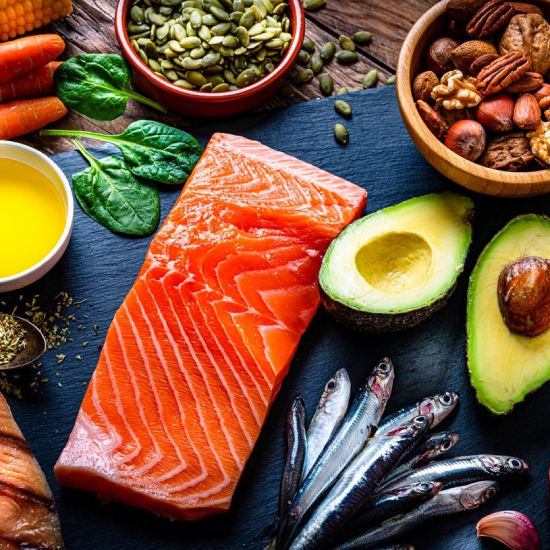
Eating well is essential for overall health, including eye health. In general, if you have a healthy diet, you don’t need vitamins or supplements, but there are certain nutrients that are absolutely essential for vision. Read on to learn more!
Most people have probably heard that carrots are good for your eyes. There is some truth to this…if you have a deficiency of vitamin A, you could be at risk of developing night blindness. Carrots are rich in beta carotene, which gets converted into vitamin A in your body.
Other antioxidants, such as lutein, zeaxanthin, selenium, and vitamins C and E, may reduce the risk of age-related macular degeneration (AMD) as well as cataracts, possibly by reducing inflammation.
Lutein and zeaxanthin are found in green leafy vegetables such as kale, spinach, broccoli, peas and lettuce, as well as egg yolks.
Selenium is in Brazil nuts, seafood, lean meat, and pasta.
Vitamin C rich foods include fruits such as oranges, apples, pineapple, and watermelon, and vegetables such as cabbage, cauliflower, celery, bell peppers and brussels sprouts.
Vitamin E is in avocado, pomegranate, pumpkin, mango, corn, asparagus, and sweet potato.
“Jackpot” foods with both vitamin C and E include berries, kiwi, guava, papaya, tomatoes, broccoli, and dark green leafy vegetables such as spinach and kale.
Eating fish rich in omega-3 fats may also be helpful for eye health. Several studies have shown that people who consumed more omega-3 from fish were less likely to develop AMD or reduce their risk of diabetic retinopathy. Additionally, omega-3 fats might even reduce the incidence of dry eye syndrome. Fish rich in omega-3 include salmon, sardines, Atlantic mackerel, cod, herring, lake trout, and canned light tuna.
If you are noticing a pattern here, fruits and vegetables have a lot of nutritional value, as do fish and lean meats. One diet which hits all of the targets is the Mediterranean diet. Multiple studies have found evidence that following a Mediterranean diet may lead to heart and eye health benefits. A randomized controlled trial showed that people with intermediate AMD who closely followed a Mediterranean diet were less likely to progress to advanced AMD.
What about supplements? If you eat a healthy diet that includes many of the foods mentioned above, you probably don’t need to take supplements. An important exception, however, is if you have been diagnosed with AMD. Multiple studies (AREDS/AREDS2) have shown benefits of antioxidant/zinc supplements for people with intermediate AMD or severe AMD in one eye. In these cases, taking a specific supplement formula can reduce the progression of the disease. Bausch & Lomb has a patent on specific formulations marketed under the name PreserVision, which includes Zinc, Lutein, Zeaxanthin, Vitamin C, Vitamin E, and Copper. There are alternative products available, but these may or may not contain the correct amounts of ingredients. If you do have AMD, consider taking supplements to reduce the progression of the disease.Talk to your eye doctor!
In conclusion, for healthy eyes (and a healthy body), try to eat a varied nutritious diet, which includes lots of fresh fruits, vegetables, and fish. On top of a healthy lifestyle, the best thing you can do to maintain good eye health is to have regular eye exams.
Schedule an eye exam at Acuity Vision Optometry Boutique to maintain your eye health and discuss options that are right for you! Call 415-673-2020 or click here to make an appointment.
Yours in wellness and in health,
Dr. Lyndi Schmidt
Founder, Acuity Vision Optometry Boutique


